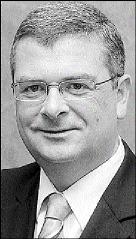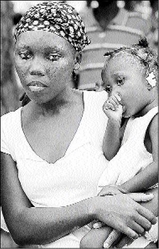
Digicel Group CEO Colm Delves. - File
IT HAS been a mere month since the seemingly apocalyptic events of January 12 overwhelmed Haiti and rallied the world to care.
But, in a stunningly heart-warming turn of events coming in the aftermath of devastation and loss, it has been the unshakeable Haitians who have been the inspiration to many who have gone in to help them.
A Digicel team ventured into the unknown in the aftermath of the unthinkable devastation on the Haitians, already acquainted with grief, loss and hardship, but the members came away with the unexpected.
Led by chairman Denis O'Brien, the team harboured fears that the earthquake would have finally pushed the people already teetering over the edge, once and for all into the precipice of despair and hopelessness.
But instead, the life-shattering experience has had quite the opposite effect on them, for the people of Haiti have demonstrated super-human efforts to rise out of the rubble.
That's the experience of Digicel's head honcho, Colm Delves, who has been making weekly trips into Haiti.
"It's been really humbling," declared the Digicel Group's chief executive officer.
For the Digicel team, venturing in and out of Haiti since the horrifying events just over a month ago, and working with the natives to rebuild their lives has been an uplifting and eye-opening experience never to be forgotten.
"This is an experience that I am not allowed to forget. I was shocked at the whole experience and taken aback by the solidarity among people whose lives have been so affected," asserted Delves.
Digicel has been so involved in the rebuilding effort that the mayor of Port-au-Prince on Tuesday, appointed O'Brien an honorary ambassador of the city.
"In that capacity, we will continue to ensure that Haiti gets the attention it deserves," Delves asserted.
Outside of the millions of United States dollars being injected into the rebuilding effort by his mobile firm, O'Brien has dipped into his pockets to fund several projects in the earthquake-ruined state.
Hope of the people
But even more than the generosity displayed by the entire Digicel team, Delves spoke glowingly of glittering hope and shining examples of the Haitians, bursting through the ruin and rubble of their broken lives.
For him, the positive attitude of the Haitians has been the greatest inspiration to the philanthropic-minded people who have ventured into the Caribbean territory, littered with deaths and debris for the past month.
But it is not only the Digicel boss on which the attitude of the Haitians has had such an arresting effect.
His colleague, Antonia Graham, is just as awestruck - not by any dehumanising effects of the earthquake, but the simple, humanitarian attitude of the Haitians.
"It has been eye-opening, uplifting, devastating and unforgettable," Antonia sighed in one breath. "You see people together, coping and getting along with their lives; it's just breathtaking," she gushed.
Antonia, who has been to Haiti twice since the earthquake, has adamantly refused to use the word 'resilient' to describe the Haitians.
For her, the word was overused and simply inadequate to characterise the attitude of the Haitians.
"The Haitians are even capable of making jokes through text messages about their experiences. It's just, well, words escape me."
Delves asserted that the Haitians signalled that they are eager to leave the demons of the past, as well as those of the present, behind to usher in a new dawn.
When Delves spoke with The Gleaner last week, he had just arrived from Haiti, from one of his weekly visits to the Caribbean state since the quake's terrifying assault.
He sat in his office, devoid of the attire one comes to expect from a senior executive. But of course, there are now hardly any corporate offices in Haiti.
Change is happening
Naturally, the devastating spectacle of a city in ruins in the aftermath of the earthquake remains etched indelibly in Delves' mind.
"Empty streets, the putrid smell of the dead and decaying, were everywhere."
He said that in those early days in the midst of wreck and ruin, the evidence of aid pouring in was present at the airport, but not too far from there.
"That's all changing now," he commented. "I see a lot of progress being made, roads cleared, the dismantling of buildings, shops have opened up. Trade, a main feature of Port-au-Prince, has been revived and banks and restaurants have reopened, and traffic is busy.
"People are just trying their best to regain some semblance of nor-mality," he added.
But it was in the early days after the catastrophic jolt, that the Digicel team knew they had to play a big role in the rebuilding effort.
"Why? Because we just had to," Delves said. "We did not have a choice. We had formed a tight relationship with Haiti, but that aside, we had a moral obligation to do so."
And indeed, the Digicel team has been at it - giving of themselves in every shape and form.
Initially, as a corporate entity, it has pumped US$5 million into the effort.
The organisation has given away another US$10 million in phone credit to the people of Haiti.
But not to be outdone, Digicel's staff and customers have raised US$1 million.
In a light-hearted moment of camaraderie, Digicel's staff members put up US$10,000 to have their boss change his conservative hairstyle.
The result - Delves went to the barber and is now sporting a new look.
And what of the US$10,000? Well, that's in the coffers of the relief effort.
A gesture that has generated a particularly humbling effect on Delves and Graham was the selfless act of giving by the Digicel staff in Haiti, 80 per cent of whom have been left homeless after the quake.
"They found 4,000 people who were without water, food and shelter. The staff packaged their food and some other things that were allotted to them and just gave to the 4,000 people," Delves recounted.
"We really have a tremendous workforce with a great attitude, but they have never been given much of a chance," he said.
There is more that Digicel is doing, but Delves thinks that should remain between Digicel and the people of Haiti.
Plans for education
But there was one ambitious project that surfaced as he spoke with The Gleaner, a plan to push start the restoration of education for the children of Haiti.
Delves divulged that Digicel has purchased a 10-square-foot tent in the United States and shipped it to Port-au-Prince to house the staff of Haiti's Ministry of Education.
"Education is critical and the staff of the ministry has no where to work, as their offices were completely demolished," Delves asserted.
"We will be putting in flooring and computers to make the ministry functional once again."
Delves disclosed that the Digicel chairman has taken particular interest in restoring the Iron Market located in downtown Port-au-Prince, said to be akin to Jamaica's famed Corona-tion Market, with similar historic significance.
"Mr O'Brien recognises not only the historical significance, but the importance of the market as a trade centre."
Delves notes that a month after the earthquake, approximately 500,000 people are still living in tents, many of which are makeshift.
He said that with the range of deadly diseases still one of the dreaded possibilities, an immediate concern is to protect the Haitians before the rainy season approaches.
For him, surface drainage remains a number one priority, but he notes that the authorities are moving with dispatch to address the challenges.
The Digicel team hopes that when the dust settles and the rubble is gone, there will be a successful Haiti bolstered by firm infrastructure in a place which has been plagued by misfortune and bad luck.
He said that, with the likelihood of natural disasters, Digicel hopes that Haiti will finally be the beneficiary of a cohesive plan that will enable it to rise from the ashes like the Phoenix.
"I hope we can have a city that sits at the doorstep of the United States, which is self-sufficient in the medium term," Delves said.
gary.spaulding@gleanerjm.com

A Haitian woman waits with her child to collect supplies from a Jamaica and United Nations team, in the quake-battered capital, Port-au-Prince, last month. - Ian Allen/Photographer
'Empty streets, the putrid smell of the dead and decaying, were everywhere. That's all changing now. I see a lot of progress being made, roads cleared, the dismantling of buildings, shops have opened up. Trade, a main feature of Port-au-Prince, has been revived and banks and restaurants have reopened and traffic is busy. People are just trying their best to regain some semblance of normality.'